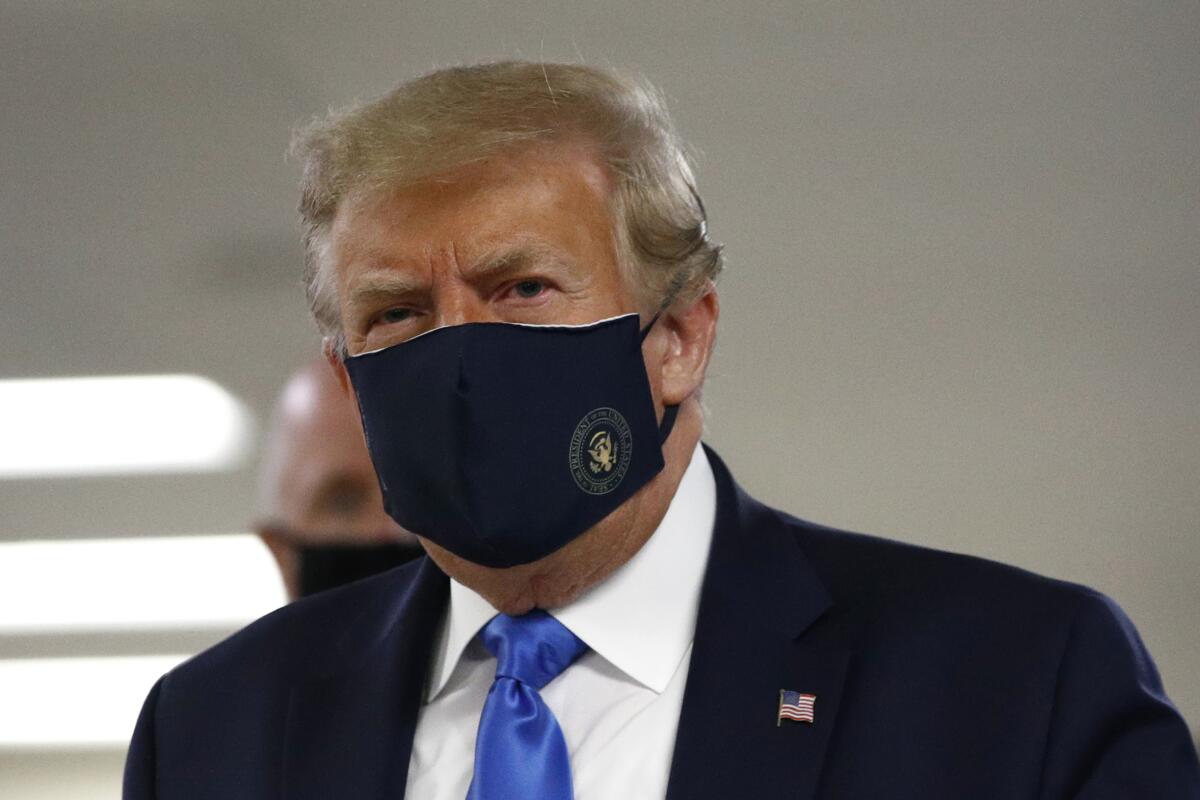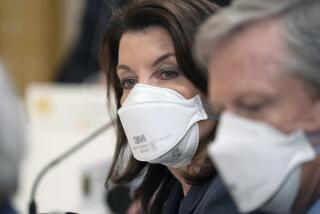As infections soar, Trump finally dons a face mask. At this point, will it help?

- Share via
WASHINGTON — The messaging was unmistakable: Surgeon Gen. Jerome Adams, appearing on a network news-talk show Sunday, wore a large white mask that left little showing but his eyes — which were wide and impassioned as he pleaded with Americans to wear face coverings in public to slow the spread of the coronavirus.
Adams is often photographed wearing a mask. Still, it was unusual, and telling, for him to don one while alone on camera for an extended interview, slightly muffling his speech.
But a day earlier, his boss, President Trump, had finally made a significant symbolic concession: After months of refusing to wear a mask in public, Trump for the first time allowed himself to be photographed by assembled media while wearing a face covering. He was visiting Walter Reed National Military Medical Center in Bethesda, Md., at the time.
With new infections spiking from Florida to Oregon, the president’s belated move could make it easier for White House staff, as well as Republican governors and members of Congress, to appeal to Americans to wear facial coverings.
However, his long resistance to mask-wearing has been a factor in an anti-mask movement that has become entrenched in many parts of the country. Much of the current surge in coronavirus cases is also occurring in states such as Florida and Arizona, whose Republican governors moved early to reopen, without a statewide masking requirement, cheered on by Trump.
Social media posts featuring clashes over masks have become a pandemic staple, featuring people who proclaim their right to go bare-faced in supermarket aisles, coffee shops and taco joints, sometimes resulting in shouting matches or scuffles with passersby or unfortunate employees.
Even if Trump’s latest action alters the cultural warfare over masking, other elements of administration coronavirus policy are coming under new fire as the pandemic worsens.
Education Secretary Betsy DeVos took to the talk shows to defend Trump’s push for quick school reopenings, including his threat to withhold federal funding from schools that do not resume full-time in-person classroom learning in coming weeks.
On “Fox News Sunday,” host Chris Wallace challenged DeVos, suggesting that threatening a funding cutoff — even if the administration had the power to impose one — was “exactly the wrong answer” if the goal was to ensure a safe reopening. The education secretary responded that “if schools aren’t going to reopen … they shouldn’t get the funds.”
In a separate interview, on CNN’s “State of the Union,” DeVos asserted that there was “nothing in the data that would suggest that kids being back in school is dangerous to them,” and that even for teachers with vulnerabilities, there are “ways for those teachers to be able to continue to do what they do.” She also declined to say whether schools should follow guidelines by the national Centers for Disease Control and Prevention.
Trump, who rarely acknowledges having second thoughts about a previously held position, denied that his new stance in support for masks marked a U-turn from his oft-stated distaste for wearing them and mocking presumptive Democratic presidential opponent Joe Biden for doing so.
“I think it’s a great thing to wear a mask; I’ve never been against that,” he told reporters at the White House after his foray to Walter Reed.
Trump had telegraphed his evolving position in a Fox interview earlier this month, when he said he didn’t mind the way he looked in a mask, likening his appearance to the Lone Ranger, the fictional character depicted in a mask covering his upper face with slits for eyes.
But until Saturday, he maintained his refusal to be photographed in one by the assembled news media.
In the early months of the contagion, the White House repeatedly defended Trump’s reluctance to be seen publicly wearing a mask, pointing out that both he and those around him were tested frequently and did not need to take the precaution of covering their faces.
Public health experts despaired that the president was undermining a message that mask-wearing reflects social responsibility in an unprecedented national and worldwide crisis, primarily as a means of protecting others rather than oneself.
“I do think it would have been better to have started wearing masks, demonstrating wearing masks at the highest levels of government, a long time ago,” Thomas Inglesby, director of the Center for Health Security at Johns Hopkins University, said on “Fox News Sunday,” when asked about Trump’s seeming change of heart.
“But at this point, I think the most important thing is to look forward and to think about what will make the most difference,” Inglesby said. “And I think that having the president, the vice president and governors wearing masks when they’re out in public is the right thing to do.”
House Speaker Nancy Pelosi (D-San Francisco), who has been sharply critical of the administration’s handling of the coronavirus crisis, including Trump’s history of going without a mask in public, said the president had “crossed a bridge” by being photographed at the head of a phalanx of aides, also wearing facial coverings. Trump’s navy-blue mask was embossed with a gold presidential seal.
“I’m so glad that he obeyed the rules of the Walter Reed,” Pelosi said on CNN’s “State of the Union.” “So, hopefully, by his example, he will change his attitude, which will be helpful in stopping the spread of the coronavirus.”
While Trump’s new stance may embolden administration officials to take a stronger stance for face-covering, the subject of a nationwide order, disfavored by Trump, remains a sensitive one.
Adm. Brett Giroir, a member of the coronavirus task force, said on ABC’s “This Week” that mask-wearing is essential in public settings where distancing is not possible. But asked about the need for a nationwide mandate, he demurred: “I’m not the person who can say.”
Trump allies such as Carlos Gimenez, the Republican mayor of Miami-Dade County in hard-hit Florida, offered praise for the president‘s efforts to combat the coronavirus while carefully avoiding any criticism of recent actions, such as an unmasked visit to Florida last week.
“I was on the tarmac to greet him,” Gimenez said. “And myself and everybody else that was there was tested an hour before. He kept his distance. So, I understand.”
Adams, the surgeon general, has for weeks been a major proponent of mask-wearing, although early in the pandemic, he urged people not to buy them. He now attributes that early opposition to initial concern about saving medical masks for health professionals, and to changing knowledge about the nature of the virus’ contagiousness and means of transmission.
“Science is about giving the best recommendation,” he said on CBS’ “Face the Nation.” Saying he was addressing the people of America directly, he declared: “You should wear a face covering.”
Inglesby said he didn’t think it was useful to think about mask-wearing “as a personal choice.”
“We don’t think it’s a personal choice to drive through a neighborhood at 80 miles an hour — we agreed to slow down because we want to protect kids,” he said. “The same thing is true here. We want to wear masks to protect our neighbors.”
More to Read
Get the L.A. Times Politics newsletter
Deeply reported insights into legislation, politics and policy from Sacramento, Washington and beyond. In your inbox three times per week.
You may occasionally receive promotional content from the Los Angeles Times.










